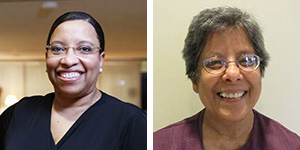PNW Race, Racism, Anti-Racism Series
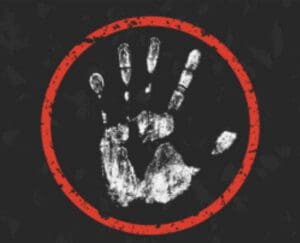
Since the brutal killing of George Floyd, millions of people (Americans and others) were shocked and outraged. Hundreds of protests were held in cities across America – perhaps the largest demonstrations against racism since the Civil Rights Movement of the 1960s. Urgent questions about inequality, racial discrimination, and police violence opened up a national dialogue that continues despite the conviction and sentencing of Derek Chauvin.
Thanks to all who joined us for the Spring 2022 PNW Race, Racism, Anti-Racism Series! The series was dedicated to the spirit and memory of Mr. Glen Ford (1949-2021), journalist and co-founder of Black Agenda Report, who passed away in an untimely manner on July 28, 2021. We owe a debt of gratitude to Mr. Ford for being our first guest speaker for this series in September 2020.
In 2020, PNW faculty offered Race, Racism, Anti-Racism, a free educational faculty-driven series, with discussions reflecting on these recent events and social movements.
In its third year, the successful free, educational series, “Race, Racism, Anti-racism,” featured five lectures presented by PNW faculty members from the College of Humanities, Education, and Social Sciences. Karen Bishop-Morris, associate professor of English at PNW, will act as moderator for the series.
This series fosters dialogue to contribute to the deeper understanding of race, racism and race relations within the United States and throughout the world. Deepa Majumdar, professor of Philosophy at PNW, organized the lecture series in response to the protests and demonstrations being held across the country. This fall she and fellow faculty members are looking to continue the conversation with a focus on framing racism within a larger picture.
View Past Talks
January 18, 12:30 – 1:45 p.m.
“Necro-Being: The Worst Form of Racism”
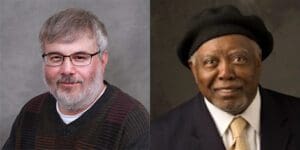 Interview of Leonard Harris, Ph.D., Professor of Philosophy at Purdue West Lafayette by PNW Professor of Philosophy David Detmer, Ph.D.
Interview of Leonard Harris, Ph.D., Professor of Philosophy at Purdue West Lafayette by PNW Professor of Philosophy David Detmer, Ph.D.
Harris says, “Necro-being, as I present it, is a condition that kills and prevents persons from being born. Racism is a form of necro-being: it kills and prevents persons from being born. Racism is a polymorphous agent of death, premature births, shortened lives, starving children, debilitating theft, abusive larceny, degrading insults, and insulting stereotypes forcibly imposed. I consider death, mortality, morbidity and irredeemable misery as primary indicators of racism across an array of types of racism globally.”
This presentation is juxtaposed to volitionism, virtue ethics and contract theory.
Synchronous Zoom
February 22, 12:30 – 2 p.m. at the Dworkin center
February 23, 3:30 – 5:45 p.m. at the Y Jean Chambers Auditorium; mix and mingle to follow in SULB third floor
“ Race, Racism, Anti-Racism and Civic Responsibilities: Candid Conversations with Tim Wise”
 Tim Wise, prominent anti-racist educator and writer
Tim Wise, prominent anti-racist educator and writer
Wise examines DEI (Diversity, Equity and Inclusion) efforts in educational, government and/or corporate settings, and how those efforts either support real change or perpetuate institutional inequity.
As he explains in this speech, much of what gets done under the rubric of DEI doesn’t challenge fundamental cultural norms or practices that contribute to inequity, rendering DEI efforts DOA (Dead on Arrival), regardless of the good intentions of those charged with implementing them.
Until those structural impediments to change are explored and altered, institutions are setting up their DEI officers for failure, letting down their employees, staff and/or students of color, and doing real damage to the cause of justice. Wise will provide examples of structural changes and institutional norms that promote equity, so that participants can walk away with tangible ideas on how to move real DEI work forward.
Hybrid In-Person and Zoom
Please note: the PNW Bookstore will be selling copies of Tim’s books. They can be purchased ahead of time and brought to the events for signing. The signing location after the Hammond event will be the PNW Bookstore.
March 1, 12:30 – 1:45 p.m.
“ Racism, Being Color Blind and Beauty”
 Meiko Yamada, Ph.D. Professor of Sociology at Purdue University Fort Wayne and Deepa Majumdar, D.S.Sc., Professor of Philosophy at PNW.
Meiko Yamada, Ph.D. Professor of Sociology at Purdue University Fort Wayne and Deepa Majumdar, D.S.Sc., Professor of Philosophy at PNW.
Despite the decades since the Civil Rights Act, racial inequality lingers in America. Color-blindness as the legitimate view of race neglects racial disparities, concealing many isms and obscuring the lack of discussion accompanying political correctness.
Yamada will discuss how color-blindness is a new challenge today and how we can tackle contemporary racism. Often, our power-laden view of physical beauty (which lies in the eye of the beholder) expresses racism. Majumdar will use Plato to speak of the ascent away from subjective beauty towards one that prioritizes the beauty of character.
March 22, 12:30 – 1:45 p.m.
“ From Barriers and Biases to Belonging: Lessons from a Female Physicist”
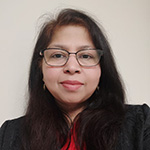 Neeti Parashar, Ph.D., Professor of Physics at PNW and Institution Leader at Fermilab and CERN.
Neeti Parashar, Ph.D., Professor of Physics at PNW and Institution Leader at Fermilab and CERN.
The identity of the scientist implies a sense of belonging, and yet is often undermined by a lack of racial equity. This assertion is borne out by the data which reveals that the percentage of degrees earned by scientists of color dangles perilously in the single digits (AIP, 2019).
This presentation will address certain barriers through the lens of a female physicist – born and raised in a “third world” country, and eventually settled in the world’s most scientifically advanced country. Parashar will present ways to mitigate the systemic behaviors that result in marginalization of certain groups.
Synchronous Zoom
April 6, 12:30 – 1:45 p.m.
“ The Racial Face of War” (Canceled)
This event has been canceled.
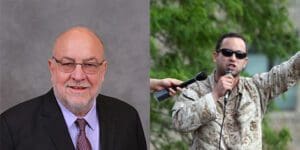
Kim Scipes, Ph.D., Professor of Sociology at PNW and Vince Emanuele, PNW Alumni and Marine Veteran.
Wars fought by the United State (since 1945) have been fought against people of color. How does growing up in the US, with our history of racism and white supremacy, impact how the US fights its wars? How does it affect individual Marines or soldiers who fight these wars?
Vince Emanuele, a white enlisted man from Chesterton, IN and a Marine veteran of two deployments to Iraq, talks with Kim Scipes (himself a Vietnam-era Marine veteran) about why he volunteered to serve, his experiences in Iraq and the understanding he has developed since his time in the military.
“Who is hurt by racism? You might be surprised to find out….”
 Alan J. Spector, Ph.D., Professor of Sociology and Center for Global Studies at PNW.
Alan J. Spector, Ph.D., Professor of Sociology and Center for Global Studies at PNW.
Racial discrimination and racist ideas are a reality in US society. Many people are confused about who is responsible. Many white people who don’t consider themselves “racist” nevertheless imagine themselves forced into a competition with members of other race-ethnic groups. Heather McGhee and other researchers over the past fifty years have challenged this “Zero Sum” framework with evidence examining just what happens to the living conditions of white people when People of Color experience more discrimination or less discrimination. These issues will be explored in this forum.
Princes of Peace and Ethics of Protest: Gandhi, King, Dalai Lama, Mandela
Karen B. Morris, Ph.D., Associate Professor of English at PNW with Deepa Majumdar, D.S.Sc., Professor of Philosophy at PNW.
We begin this dialogue by asking why political protest must be ethical. We continue by discussing political enmity, the moral imperative of nonviolence, and the difference between strategies and moral ideals or guiding principles – asserting that strategic thinking should never degenerate to mere expediency.
We take turns to present Gandhi, King, Dalai Lama, and Mandela – four recent princes of peace, who represent flares of Conscience in what might otherwise be a murky history of revolution. All four combine religion with protest politics – but at a high level.
At lower levels, church and state should be separate because religion and politics explode whenever they mix. But, at a higher level religion uplifts and ennobles protest politics – as these luminaries demonstrate.
The nonviolence they practiced and the moral altitude they reached may not always be feasible. But this does not reduce their relevance or take away from their glory. For they represent the horizon of ideals that mankind should always aspire towards.
Implications of Race and Racism in Student Evaluations of Teaching: The Hate U Give
 Book launch with LaVada U. Taylor, Ph.D., Associate Professor of Education at PNW and Donyell Rosoboro, Ph.D., Ramon Vasquez, Ph.D and Jonathan Lightfoot, Ph.D.
Book launch with LaVada U. Taylor, Ph.D., Associate Professor of Education at PNW and Donyell Rosoboro, Ph.D., Ramon Vasquez, Ph.D and Jonathan Lightfoot, Ph.D.
Implications of Race and Racism in Student Evaluations of Teaching: The Hate U Give highlights practices in higher education such as using student course evaluations of teaching to inform merit increases, contract renewals, and promotion and tenure decisions. The collection deconstructs student course feedback to reveal implications of race and racism inherent in student responses mirroring learned behavior situated within the socio-political context of US culture and schools.
Learned behavior fostering racial hate given to students informing and shaping their classroom experiences with BIPOC faculty. To this end, the work speaks to systemic racial inequality in higher education learning spaces and possibilities of reimagining student evaluations as a cry for a more just and equitable society.
The Origins and Future of Critical Race Theory
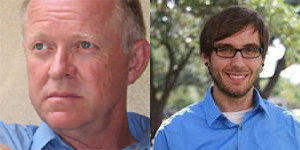 Lee B. Artz, Ph.D., Professor of Media Studies and Director of the Center for Global Studies at PNW (left) with Patrick Anderson, Ph.D., Assistant Professor Philosophy, Central State University, Dayton, OH, and Contributor: Mint Press News and Black Agenda Report.
Lee B. Artz, Ph.D., Professor of Media Studies and Director of the Center for Global Studies at PNW (left) with Patrick Anderson, Ph.D., Assistant Professor Philosophy, Central State University, Dayton, OH, and Contributor: Mint Press News and Black Agenda Report.
Beginning with an overview of the work of Derrick Bell, the “father of critical theory,” Peterson introduces a robust intellectual and political history of critical race theory as racial realism. Working from a Black radical tradition and anti-colonialism, Peterson offers a critique of intersectionality as an idealist, liberal iteration of critical race theory.
Unheard Voices Of Protest
Three leaders of protests against racism and police violence engaged in a roundtable discussion about how they are strategically and tactically challenging racist practices in the US. Aislinn Pulley (Chicago Black Lives Matter), Jae Yates (Twin Cities Coalition for Justice) and Missie Summers (Porter County BLM) led a panel conversation hosted by PNW professor of media studies Lee Artz.
Health, Equity and Communities of Color
On World Cancer Day, associate professor of English Karen Bishop-Morris talks with Tranece Artis (Executive Director, Laini Fluellen Charities), Shari McKinley (Engagement Supervisor, ACCESS Community Health) and Rachel Nagengast (ACCESS Cancer Education Program Specialist).
Race, Gender and the 2020 Election
Nadia E. Brown, associate professor of political science, Purdue West Lafayette, assesses the nation’s commitment to democratic ideals, focusing on the inclusion and exclusion of minoritized groups during the 2020 election, especially Black women voters and candidates.
The 1619 Project and the Summer of 2020
With reference to The 1619 Project marking the 400th anniversary of the arrival of slave ships in Virginia, the impact of British colonialism in Africa and also the protests and riots during the summer of 2020, PNW professor Mita Choudhury will provide a historical overview of systemic racism, institutional bias and prejudice, and the weak guard rails of “western civilization.”
The Return of Black-Led Grassroots Politics
What are the structures and practices of racism in the US? How do protests, defunding police, and removing statues address inequality? What do protests accomplish?
Glen Ford
Executive Editor, Black Agenda Report, a leading independent Black journal
Race and Wrongful Convictions
How is the criminal justice system racially biased? What practices by police and courts express and affect race inequality? What actions might challenge wrongful convictions?
Nicky Jackson, Ph.D. (Associate Professor, PNW ) with Roosevelt Glenn (Author and Exoneree)
Media Framing and the Politics of Racism
How do media frame police violence and protests? How do media promote politician reforms and silence black voices for systemic change? How do media represent race relations?
Lee Artz, Ph.D.
Professor of Communication, PNW
How to Talk About Race in the 21st Century
What is the global context for race? What is the connection between race and colonialism? How can we understand individual and systemic racism?
Kim Scipes, Ph.D.
Professor of Sociology, PNW
NWITimes
PNW’s ‘Race’ Discussion Looks Ahead To Next Steps in Social Justice Movement
La Porte County Herald-Dispatch
Black Lives Matter, Other Protest Groups Seeking To Be Heard Again
La Porte County Herald-Dispatch
Purdue Professor Says Voter Restrictions Not Second Coming of Jim Crow, Just a Continuation
Chicago Tribune
PNW Faculty to Begin Monthly ‘Race, Racism, Anti-Racism’ Series for Students, Community
Herald Dispatch
Purdue Northwest Faculty Members Hope to Combat Racism Through Education
NWITimes
Purdue Professor, Exonerated Gary Man Set To Discuss Race and Wrongful Convictions
Herald Dispatch
Championing a Transformation of Society to Fight Racism
Herald Dispatch
How the Media Can Reframe a Protest is Next Topic of Purdue Series on Racism
Herald Dispatch
Lies, Distortions, Misinformation
US News & World Report
Wrongfully Convicted Indiana Man Seeking Justice Reform
Series Coordinator
Deepa Majumdar, D.S.Sc.
Series Moderator
Karen Bishop-Morris, Ph.D.
